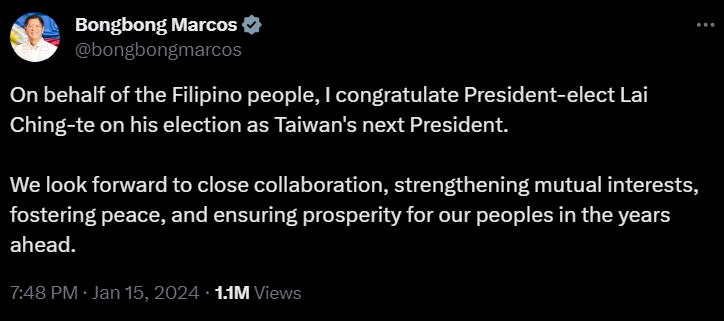China Issues Stern Warning as Taiwan’s Election Congratulations Spark Diplomatic Tensions
China has recently issued a strong condemnation against countries, including Singapore, for sending congratulatory messages to the winner of Taiwan’s presidential elections.
The stern warning came after Singapore’s Ministry of Foreign Affairs (MFA) congratulated Dr William Lai of the Democratic Progressive Party for his victory on 13 January 2024, prompting China to emphasize the importance of adhering to the one-China principle.
Spokesperson for Chinese Foreign Ministry Speaks Out
In a briefing on 15 January 2024, Mao Ning, the spokesperson for the Chinese foreign ministry, addressed several questions about the Taiwan elections.
The self-governing island has elected a politician deemed as friendly to the United States, and this political move is in turn branded by China as an “instigator of war.”
One of the questions involved Singapore, following MFA’s congratulatory message to Dr William Lai.
Singapore has been issuing similar statements when the current president Tsai Ing-wen and her party won past elections in 2020 and 2016.
However, this time, Singapore is facing China’s diplomatic reprimand.
China has lodged “solemn démarches” against Singapore as a reminder of its “one-China” position on Taiwan.
A “solemn démarche” is essentially a diplomatic reprimand.
“Singaporean leaders stated on multiple occasions that the Taiwan question is ‘a deep red line’ for China,” said Mao in the briefing. “China values this statement and hopes that Singapore will strictly abide by the one-China principle and uphold the overall friendly relations between China and Singapore with concrete actions.”
The spokesperson Mao also responded to comments from the US, Japan, and some European countries expressing intentions to send delegations to Taiwan for congratulations, labeling such actions as “wrong practices violating the one-China principle.”
The one-China principle asserts that there is only one China globally, with Taiwan considered an inalienable part of it.
Mao highlighted that the one-China principle is the political premise for establishing diplomatic ties with other countries.
China vehemently opposes official communications with Taiwan by foreign powers and views any violation of this principle as interference in its internal affairs and an infringement upon its sovereignty.
As of the morning of 17 January 2024, the MFA had yet to respond to China’s declaration of a “solemn démarche”.
However, in its statement congratulating Dr William Lai on 14 January, it was written that, “Singapore shares a close and longstanding friendship with Taiwan and the Taiwanese people, and will continue to grow this relationship based on our “One China” policy.”
Philippines Ambassador Summoned
Other than Singapore, another Southeast Asian country’s diplomatic ties with China was also brought into question.
On 15 January 2024, the Philippines’ President Ferdinand Marcos Jr made a post on social media platform X (formerly Twitter) congratulating Taiwan’s president on his election victory.

The post wrote, “We look forward to close collaboration, strengthening mutual interests, fostering peace, and ensuring prosperity for our peoples in the years ahead.”
Mao asserted that the statement was a severe violation of the One China Principle and a significant breach of the Philippines’ political commitments to China.
She criticized the Philippines for interfering egregiously in China’s internal affairs and urged them to cease their inappropriate actions and words regarding Taiwan, cautioning against sending misleading signals supporting Taiwan independence.
Mao also specifically advised President Marcos to broaden his knowledge of Taiwan’s history for a more accurate understanding and informed decision-making.
This recent uproar is the newest episode in a series of conflicts between the Philippines and China.
These tensions coincide with Manila strengthening its relations with its former colonial ruler, the United States. Notably, this includes the expansion of an agreement allowing Washington’s utilization of Philippine military bases.
Responding to these remarks, the Philippines’ foreign ministry issued a statement on Tuesday, reiterating the country’s commitment to the “One China policy.”
It clarified that Marcos’ message aimed to acknowledge the mutual interests between the Philippines and Taiwan, particularly concerning the well-being of 200,000 overseas Filipino workers on the island.
The ministry explained that the message expressed gratitude for hosting Filipino workers and conducting a successful democratic process. However, it also emphasized that the Philippines staunchly reaffirms its adherence to the One China Policy.
The recent tensions highlight the delicate diplomatic balancing act that countries like Singapore must navigate amid growing geopolitical competition between China and the US.
Read Also:
- From 2025, You Won’t Need to Book an Appointment to Collect Your Passport or IC
- 16 Women Accused Magician David Copperfield of Sexual Misconduct
- Everything About the Johor Police Station Attack & Their Suspects That is Known So Far
- Anchorvale Village, a New Mall in Sengkang, Officially Opens Today (18 May)
- 35 S’pore Talents Got Into Forbes’ 30 Under 30 Including Sprinter Shanti Pereira
- 30YO SCDF Officer Dies While Fighting Fire on Board Tanker in S’pore Waters
Advertisements
